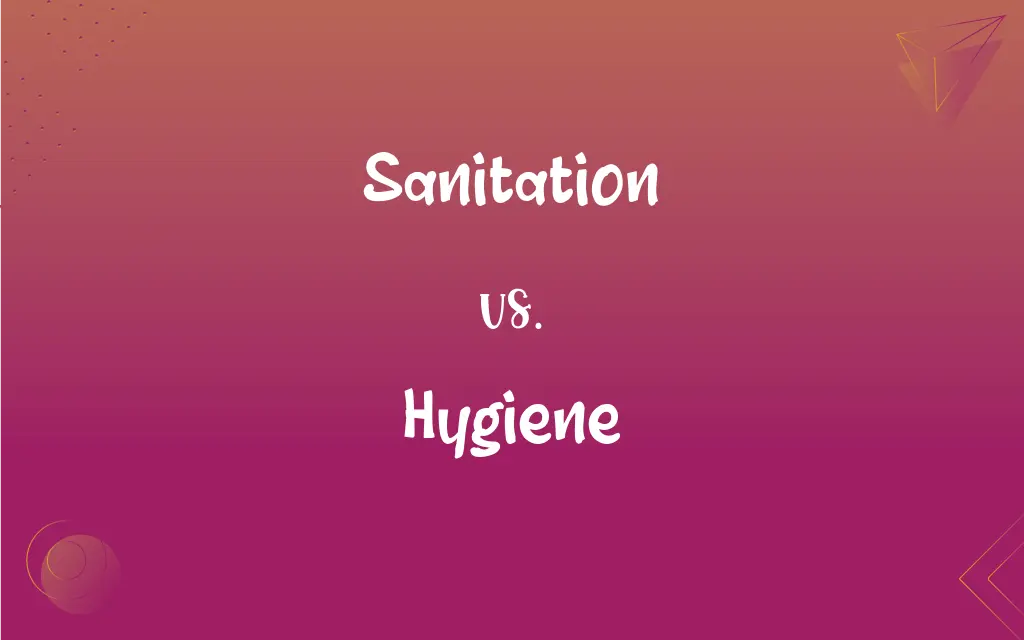Sanitation vs. Hygiene: What's the Difference?
Edited by Aimie Carlson || By Harlon Moss || Updated on October 7, 2023
Sanitation refers to systems for maintaining cleanliness and health, particularly waste disposal; hygiene relates to individual practices that maintain health and prevent disease.

Key Differences
Sanitation commonly encompasses public health conditions related to clean drinking water and adequate treatment and disposal of human excreta and wastewater. On the other hand, hygiene is more about individual behaviors and practices that help in maintaining health and preventing diseases, such as handwashing or brushing teeth.
Systems of sanitation aim to protect human health by providing a clean environment. They involve a broad range of services from the management of drinking water, garbage, and waste, to stormwater and wastewater. Conversely, hygiene focuses on personal habits and practices like hand hygiene, personal grooming, and home cleanliness.
Sanitation infrastructure like sewage systems, latrines, and wastewater treatment plants play a critical role in preventing the spread of diseases in communities. Meanwhile, hygiene is the daily responsibility of individuals, with actions like washing hands regularly and keeping personal spaces clean.
Inadequate sanitation facilities can lead to the spread of diseases like cholera, dysentery, and typhoid, as untreated waste contaminates water sources. On the other hand, poor hygiene habits, like not washing hands after using the restroom or before eating, can also lead to disease transmission.
Both sanitation and hygiene are fundamental to health, and their importance is recognized globally. World organizations prioritize sanitation services and hygiene education to reduce diseases, improve quality of life, and ensure clean environments for all.
ADVERTISEMENT
Comparison Chart
Primary Focus
Systems for cleanliness, especially waste disposal and water treatment.
Personal practices to maintain health and prevent disease.
Examples
Sewage systems, wastewater treatment plants, garbage disposal.
Handwashing, brushing teeth, bathing.
Scope
Broadly community or public-based systems.
Individual habits and behaviors.
Disease Relation
Poor sanitation can lead to diseases like cholera or typhoid.
Poor hygiene can lead to conditions like fungal infections or flu.
Implementation
Managed by governments or institutions, requiring infrastructure.
Managed by individuals, often taught from a young age.
ADVERTISEMENT
Sanitation and Hygiene Definitions
Sanitation
The process of making conditions hygienic and preventing disease through cleanliness.
Proper sanitation systems are crucial for urban areas.
Hygiene
The science of preserving and promoting health.
Schools often teach children basic hygiene from a young age.
Sanitation
The promotion of cleanliness and prevention of disease.
Sanitation efforts helped decrease the spread of waterborne illnesses.
Hygiene
Conditions or practices conducive to health.
Personal hygiene involves daily routines like brushing and bathing.
Sanitation
Measures taken to dispose of waste and pollutants.
The city improved its sanitation methods to protect local waterways.
Hygiene
The maintenance of a clean body and environment.
Regular dental check-ups are part of oral hygiene.
Sanitation
Systems to manage waste, especially human waste.
The village built new sanitation facilities to improve health.
Hygiene
Measures taken to ensure cleanliness and health.
Kitchen hygiene is vital to prevent foodborne illnesses.
Sanitation
The act of maintaining a clean environment to prevent health hazards.
Regular trash pickup is a key aspect of urban sanitation.
Hygiene
Practices and habits that maintain health and prevent disease.
Proper hand hygiene can prevent the spread of many diseases.
Sanitation
The study and application of procedures and measures designed to protect public health, as in the provision of clean water and the disposal of sewage and waste.
Hygiene
The science that deals with the promotion and preservation of health. Also called hygienics.
Sanitation
The disposal of sewage and waste.
Hygiene
Conditions and practices that serve to promote or preserve health
Hygiene in the workplace.
Personal hygiene.
FAQs
Is personal cleanliness a part of sanitation or hygiene?
It's a part of hygiene, focusing on individual practices.
What does sanitation primarily focus on?
Sanitation focuses on systems for cleanliness, especially waste disposal and water treatment.
What is the main area of concern for hygiene?
Hygiene pertains to personal practices that maintain health and prevent disease.
Why are sanitation systems important for cities?
They help manage waste, provide clean water, and prevent the spread of diseases.
Can good hygiene compensate for inadequate sanitation?
Good hygiene can mitigate some risks, but poor sanitation poses broader environmental and health threats.
What are some common hygiene practices?
Handwashing, daily bathing, and dental care are some common hygiene habits.
What's the difference between personal and environmental hygiene?
Personal hygiene involves individual practices, while environmental hygiene focuses on cleanliness in surrounding spaces.
How do communities benefit from improved sanitation and hygiene?
They experience fewer diseases, better overall health, and improved quality of life.
Do sanitation and hygiene play a role in nutrition?
Yes, sanitation ensures safe food and water, while hygiene practices prevent contamination and illness.
Who usually manages sanitation systems?
Governments or institutions typically oversee sanitation, requiring infrastructure and planning.
Are there global initiatives related to sanitation and hygiene?
Yes, organizations like the World Health Organization prioritize sanitation and hygiene to improve global health.
How does sanitation impact the environment?
Proper sanitation can prevent pollution, protect water sources, and ensure cleaner habitats.
How do sanitation and hygiene relate to health?
Both are vital in preventing diseases; sanitation through clean environments and hygiene through personal practices.
Can one have good hygiene despite poor sanitation in their environment?
Yes, but poor sanitation increases health risks even with good personal hygiene.
Why is hand hygiene emphasized in healthcare?
It's a simple, effective way to prevent disease transmission, especially in medical settings.
Can poor hygiene affect others?
Yes, diseases can spread from one person to another due to poor hygiene practices.
How do countries measure sanitation progress?
They might track access to clean water, waste management systems, and wastewater treatment.
Can poor sanitation impact hygiene?
Yes, inadequate sanitation can lead to environmental contamination, affecting individual hygiene.
What's the relationship between hygiene education and health?
Proper hygiene education can lead to better health practices, reducing disease transmission.
Why is sanitation vital for children's health?
Children are more vulnerable to diseases, and proper sanitation reduces their risk of exposure.
About Author
Written by
Harlon MossHarlon is a seasoned quality moderator and accomplished content writer for Difference Wiki. An alumnus of the prestigious University of California, he earned his degree in Computer Science. Leveraging his academic background, Harlon brings a meticulous and informed perspective to his work, ensuring content accuracy and excellence.
Edited by
Aimie CarlsonAimie Carlson, holding a master's degree in English literature, is a fervent English language enthusiast. She lends her writing talents to Difference Wiki, a prominent website that specializes in comparisons, offering readers insightful analyses that both captivate and inform.
































































